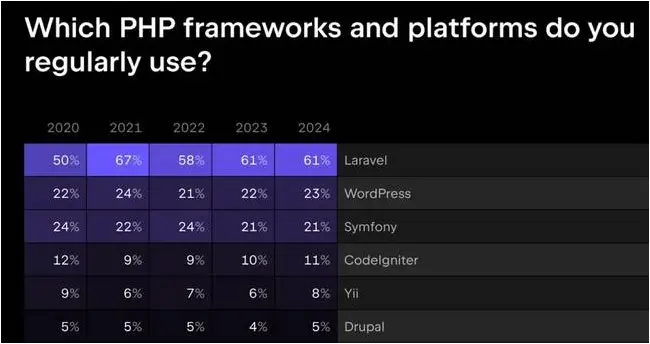Laravel Inventor Tells Devs To Quit Writing ‘cathedrals Of Complexity’
Taylor Otwell, inventor and maintainer of popular PHP framework Laravel, is warning against overly complex code and the risks of bypassing the framework.
Developers are sometimes drawn to building “cathedrals of complexity that aren’t so easy to change,” he said, speaking in a podcast for maintainable.fm, a series produced by Ruby on Rails consultancy Planet Argon.
Software, he said, should be “simple and disposable and easy to change.” Some problems are genuinely complex, but in general, if a developer finds a “clever solution” which goes beyond the standard documented way in a framework such as Laravel or Ruby on Rails, “that would be like a smell.”
A code smell – for the uninitiated in the The Reg readership – is a term developers use for code that works but may cause problems at a later date.
Otwell described himself as a “pretty average programmer” but reckons many others are the same, solving basic problems as quickly and efficiently as they can.
He built Laravel over seven months in 2010 to create a Ruby on Rails equivalent for PHP. Existing PHP frameworks were too Java-inspired, and Otwell wanted something with a built-in ORM (object-relational mapper) that offered more functionality out of the box.
Some aspects of Laravel were drawn from Microsoft’s ASP.NET MVC, he said, which has a view engine called Razor. “So I named our view engine Blade. It was directly inspired by ASP.NET.”
The framework took off and Otwell now reckons that the PHP landscape is, for most new projects, Laravel or Symfony, with Symfony perhaps more popular in Europe than in the US. There is also WordPress, which is “its own universe,” he added, and one that “we don’t tend to interact with.”

A JetBrains developer ecosystem survey found Laravel in use by over 60 percent of PHP developers
The latest JetBrains Developer Ecosystem survey found Laravel in use by 61 percent of PHP developers, followed by WordPress at 23 percent, and Symfony at 21 percent. The most recent Stack Overflow survey has Laravel used by 8.9 percent of developers overall (not just PHP) and Symfony by 4 percent. WordPress is more popular than either, at 13.6 percent, but this (like Drupal, which is also PHP-based) is not directly comparable, being a content management system rather than a general-purpose framework.
Otwell maintains a close grip on Laravel open source. “I’m the only person that merges pull requests,” he said, despite the time burden of merging or closing 10 to 15 pull requests a day, five days a week.
In 2013 and 2014, Otwell rewrote the core architecture of Laravel because of limitations that had become apparent in the original design. The rewrite broke backwards compatibility, and the experience made him determined to avoid such breakage in future unless it is for something “incredibly important” that needs a fix. He gets frustrated, he said, when other tools break, including PHP itself.
Otwell was asked about the issue of Laravel’s convention over configuration approach not playing well with standard PHP static analysis tools such as PHPStan. Otwell referenced a project called Larastan, which is an extension for PHPStan that provides specific Laravel support. He said Laravel had been originally written to “embrace the dynamic nature of PHP” but the trend now was toward strong typing and in future he would try to accommodate that. Today, he said, “maybe even the majority of PHP developers lean more on strongly typed applications.”
Laravel is also embracing React integration through tools like InertiaJS, which is specifically designed for Laravel. While Otwell admits he hasn’t written much React himself, he recognizes the strong demand from the community.
How good is Laravel? A discussion on Hacker News shows mixed opinions, as well as confirming that the 2013 upgrade was problematic. One commenter said Laravel is more beginner-friendly than Symfony “at the cost of pretty much everything else.” The discussion tends to confirm Otwell’s point, though – that getting the best from Laravel means embracing how it is designed to work.
Developers who dislike its approach will not get on well with it, but its enduring popularity suggests that many do get the results they want. ®
A considerable amount of time and effort goes into maintaining this website, creating backend automation and creating new features and content for you to make actionable intelligence decisions. Everyone that supports the site helps enable new functionality.
If you like the site, please support us on “Patreon” or “Buy Me A Coffee” using the buttons below
To keep up to date follow us on the below channels.

![[EVEREST] - Ransomware Victim: MUSE-INSECURE: Inside Collins Aerospaces Security Failure 1 image](https://www.redpacketsecurity.com/wp-content/uploads/2024/09/image-300x300.png)
![Cobalt Strike Beacon Detected - 47[.]109[.]90[.]134:88 3 Cobalt-Strike](https://www.redpacketsecurity.com/wp-content/uploads/2021/11/Cobalt-Strike-300x201.jpg)
